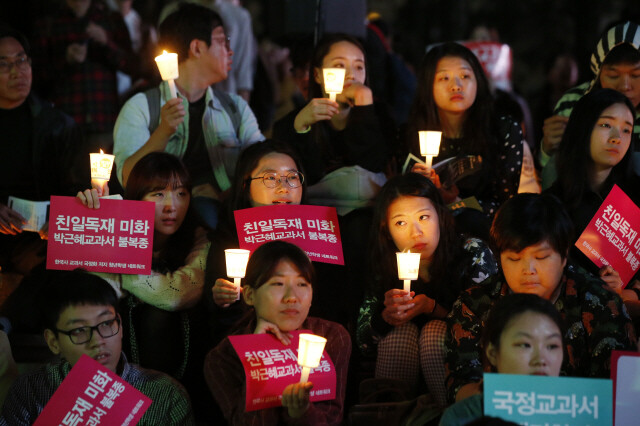hankyoreh
Links to other country sites 다른 나라 사이트 링크
For Vietnam, S. Korea had been a ‘textbook’ model…not anymore

Socialist Vietnam had adopted an authorization system for all textbooks, including those for history classes, a local newspaper said.
Vietnam had previously been categorized alongside North Korea and Bangladesh as having implemented state designation for all textbooks. The news that even a one-party Communist state like Vietnam is abandoning state designation for textbooks is expected to fan already harsh criticisms of the Park Geun-hye administration for attempting to buck a global trend by reintroducing the system.
On Oct. 20, the Hankyoreh found an article in the Communist Party of Vietnam Online Newspaper -- the internet version of the party’s official newspaper -- stating that the government had ratified a full-scale revision of the educational curriculum and textbooks on Apr. 20 aimed at establishing “a single curriculum with multiple textbooks.”
“With the textbook plan ratified by the government, the monopolistic system of single textbooks will no longer exist,” the article said.
“According to this plan, different textbooks by several different publishing companies working within the framework of a single standardized educational curriculum will be released in the 2018-19 academic year and taught in schools at various levels,” it continued.
The piece quoted former Vietnamese Minister of Education and Training Pham Minh Hac as saying the changes would be “fully in keeping with trends in advanced education.”
Pham was also reported as saying the “new plan focusing on new, student-centered textbooks and educational programs” would “enable self-directed study by allowing students to demonstrate assertiveness, initiative, and creativity.”
“It will strengthen communication between teacher and student, student and student, and teacher and teacher,” he predicted.
The article also said the adoption of “textbooks that meet the conditions for classroom use” would require “a state review and authorization committee directed by the Ministry of Education and Training, as well as test instruction with the authorized textbooks in schools at various levels.”
“Principals and campus teacher groups for different subjects should engage in discussions to ensure objectivity and choose the most appropriate books, and school libraries should acquire many books for teachers to use as a reference,” it advised.
The Hankyoreh commissioned several Vietnamese-speaking experts to translate and verify the content of the article, which was written in Vietnamese.
To date, the ministry’s National Institute for Education Strategies and Curriculum and state-run educational publishing houses have supervised the writing, publication, and issuance of textbooks under the ministry’s direction and oversight.
Since introducing economic reforms and openness measures, however, Hanoi has recognized the problems of a state monopoly on textbook publications and worked with overseas institutions to develop plans for educational reform.
Vietnam is also reported to have historically regarded South Korea as a “model” in amending its educational curriculum and textbook publication system.
“While it was planning the change to an authorization system, Vietnam sent a delegation to South Korea a few years ago to observe its educational system and the achievements from its educational reforms,” noted Bang Ji-won, a professor of history education at Silla University.
“Politically, Vietnam is still a socialist state that is strongly controlled by the Communist Party, but there has also been a social consensus taking root that textbooks need to be diversified to boost children’s competitiveness and creativity,” Bang explained.
“The Park Geun-hye administration has said it wants to train talented minds with creativity and convergence skills, but its decision to return to state-designated textbooks goes too much against global trends and the times,” she added.
By Jeon Jung-yoon, staff reporter
Please direct questions or comments to [english@hani.co.kr]

Editorial・opinion
![[Guest essay] Preventing Korean Peninsula from becoming front line of new cold war [Guest essay] Preventing Korean Peninsula from becoming front line of new cold war](https://flexible.img.hani.co.kr/flexible/normal/500/300/imgdb/original/2024/0507/7217150679227807.jpg) [Guest essay] Preventing Korean Peninsula from becoming front line of new cold war
[Guest essay] Preventing Korean Peninsula from becoming front line of new cold war![[Column] The state is back — but is it in business? [Column] The state is back — but is it in business?](https://flexible.img.hani.co.kr/flexible/normal/500/300/imgdb/original/2024/0506/8217149564092725.jpg) [Column] The state is back — but is it in business?
[Column] The state is back — but is it in business?- [Column] Life on our Trisolaris
- [Editorial] Penalties for airing allegations against Korea’s first lady endanger free press
- [Editorial] Yoon must halt procurement of SM-3 interceptor missiles
- [Guest essay] Maybe Korea’s rapid population decline is an opportunity, not a crisis
- [Column] Can Yoon steer diplomacy with Russia, China back on track?
- [Column] Season 2 of special prosecutor probe may be coming to Korea soon
- [Column] Park Geun-hye déjà vu in Yoon Suk-yeol
- [Editorial] New weight of N. Korea’s nuclear threats makes dialogue all the more urgent
Most viewed articles
- 1Behind-the-times gender change regulations leave trans Koreans in the lurch
- 2South Korean ambassador attends Putin’s inauguration as US and others boycott
- 3Family that exposed military cover-up of loved one’s death reflect on Marine’s death
- 4Yoon’s broken-compass diplomacy is steering Korea into serving US, Japanese interests
- 5Yoon’s revival of civil affairs senior secretary criticized as shield against judicial scrutiny
- 6Marines who survived flood that killed colleague urge president to OK special counsel probe
- 7AI is catching up with humans at a ‘shocking’ rate
- 8Japan says its directives were aimed at increasing Line’s security, not pushing Naver buyout
- 9[Guest essay] Preventing Korean Peninsula from becoming front line of new cold war
- 101 in 10 marriages in Korea last year was with a foreign national